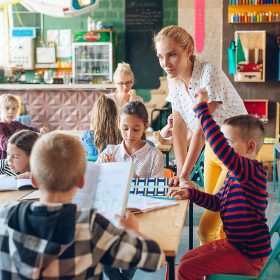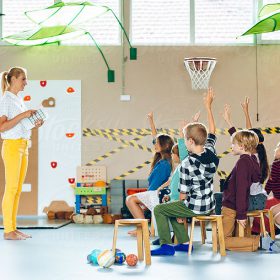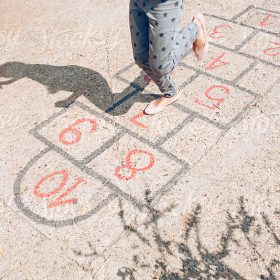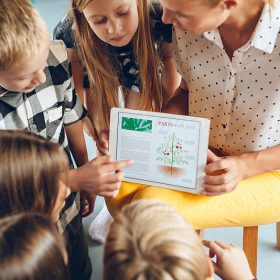Social and Personal Growth
During kindergarten, students learn that they are part of a larger community. They learn more about the world around them and how their family, home, and school are a part of it. They also learn how to better identify and express their feelings, and develop stronger empathy and understanding of others. Socializing with new classmates, learning to share and play cooperatively, and learning to assert oneself while understanding the importance of rules and authority are all key skills.
Approach to Learning: Work Habits, Work Time and Content Studies
Underlying traditional kindergarten activities is a spiraling learning process in which children imagine what they want to do, create a project based on their ideas, play with their creations, share their ideas and creations with others, and reflect on their experiences–all of which leads them to imagine new ideas and new projects. In doing so, they develop and refine their abilities to think creatively and work collaboratively. To participate fully in this process, students must develop a positive approach to learning. Students work on developing this positive approach throughout the school day, as much of kindergarten is spent learning how to learn. To focus and provide a context for their learning activities, the kindergarten class participates in three content studies: about bulbs, butterflies and moths, and pets. Learning in all subjects is enriched by its connection to a central topic.
Reading
In kindergarten, students begin to learn to read and develop a love of reading by participating in read- alouds and direct instruction. Students build foundational skills through the development of rhymes, alphabet knowledge, and sight words. They rotate through literacy centers that offer different activities to help build self-confidence in reading and reinforce the classroom lessons. Students read and are read to from a variety of genres as they develop comprehension skills. During the year, each student begins to choose and read books at the appropriate reading level.
Writing
During kindergarten, students work on a variety of opinion, informative and explanatory texts, as well as personal narratives. During writing workshop, they are exposed to models of writing, and are then given the time to write independently and the opportunity to share their work with their classmates. Students write how-to pieces, all about books, narratives about events and poetry. Much of their writing takes place in the context of content studies and is shared with their families.
Word Study (Spelling and Vocabulary)
Our word study program develops and teaches independence and confidence in writing and speaking. Kindergartners begin by learning how to form the upper-case letters of the alphabet and how to begin and end sentences. During the course of the year, students also learn how to write lower-case letters and numbers. Through exposure to print by reading and through conversation, students expand their vocabulary and knowledge of standard English conventions.
Math
In kindergarten, the primary emphasis is on representing and comparing whole numbers, and the secondary emphasis is on describing shapes and space. Students use numbers, including written numerals, to represent quantities and solve problems, such as counting the number of objects in a set, comparing sets, counting the number of objects in combined sets, and counting the number of objects that remain in a set after some are taken away. Students describe their physical world using geometric ideas and vocabulary. They identify and describe basic two- and three-dimensional shapes presented in different sizes and orientations. Students explore mathematical ideas through a variety of games and hands-on tools, including pattern blocks, tiles, counters, and dice. Throughout the year, they work independently and with partners to solve problems, practice counting and number operations, and explain their thinking.




